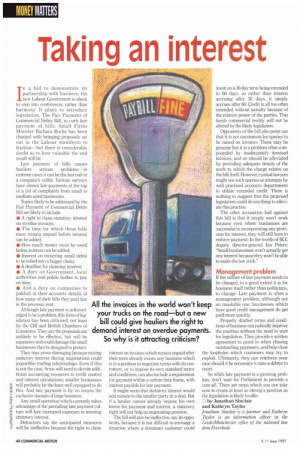Taking an interest
Page 42

If you've noticed an error in this article please click here to report it so we can fix it.
/n a bid to demonstrate its partnership with business, the new Labour Government is about to step into controversy, rather than harmony. ft plans to introduce legislation, The Fair Payment of Commercial Debts Bill, to curb late payment of bills. Small Firms Minister Barbara Roche has been charged with bringing proposals set out in the Labour manifesto to fruition—but there is considerable doubt as to how valuable the end result will be.
Late payment of bills causes hauliers serious problems—in extreme cases it can be the last nail in a company's coffin. Various surveys have shown late payments at the top of a list of complaints from small to medium-sized businesses.
Topics likely to be addressed by the Fair Payment of Commercial Debts Bill are likely to include: • A right to claim statutory interest on overdue invoices; • The time for which those bills must remain unpaid before interest can be added; • How much money must be owed before interest can be added; • Interest on recurring small debts to be rolled into a bigger claim; • A deadline for claiming interest; • A duty on Government, local authorities and public bodies to pay on time; • And a duty on companies to publish in their accounts details of how many of their bills they paid late in the previous year.
Although late payment is acknowledged to be a problem, this form of legislation has been criticised, not least by the CBI and British Chambers of Commerce. They say the proposals are unlikely to be effective, hut will be expensive and could damage the small businesses they're designed to protect.
They may prove damaging because raising statutory interest during negotiations could jeopardise trading relationships. Even if this is not the case, firms will need to devote additional accounting resources to credit control and interest calculations; smaller businesses ff, will probably be the least well equipped to do this. And late payment is by no means the
0 exclusive domain of large business.
Any small operation which currently takes ,
1-advantage of the prevailing late payment culture will face increased expenses in meeting tct statutory interest.
lL, Detractors say the anticipated measures 1 will be ineffective because the right to claim interest on invoices which remain unpaid after their term already exists: any business which is in a position to negotiate terms with its customers, or to impose its own standard terms and conditions, can also include a requirement for payment within a certain time frame, with interest payable for late payment.
It might seem that statutory interest would add muscle to the smaller party in a deal. But if a haulier cannot already impose his own terms for payment and interest, a statutory right will not help its negotiating position.
The bill will also be ineffective, say its opponents, because it is not difficult to envisage a situation where a dominant customer could insist on a 30-clay term being extended to 60 days. so rather than interest accruing after 30 days, it simply accrues after 60. Credit is all too often extended without penalty because of the relative power of the parties. This harsh commercial reality will not be altered by the likely legislation.
Opponents of the bill also point out that it is not uncommon for queries to be raised on invoices. These may be genuine but it is a problem often compounded by inadequately itemised invoices, and so should be alleviated by providing adequate details of the work to which the charge relates on the bill itself. However, cynical lawyers might see such queries as attempts by well practised accounts departments to obtain extended credit. There is nothing to suggest that the proposed legislation could do anything to alleviate this practice.
The other accusation laid against this bill is that it simply won't work because even where businesses are successful in incorporating any provision for interest, they will still have to enforce payment. In the words of BCC deputy director-general Ian Peters: "Small businessmen won't actually get any interest because they won't be able to make the law stick."
Management problem
If the culture of late payment needs to be changed, to a great extent it is for business itself rather than politicians, to change. Late payment is often a management problem, although not an insoluble one: businesses which have good credit management do get paid more quickly.
Properly drafted terms and conditions of business can radically improve the position without the need to wait for legislation. They provide a written agreement to point to when chasing outstanding payments, and help close the loopholes which customers may try to exploit. Ultimately, they can reinforce your case should it be necessary to take a debtor to court.
So while late payment is a growing problem, don't wait for Parliament to provide a cure-all. There are steps which you can take now to create at least as strong a position as the legislation is likely to offer.
CI by Jonathan Sinclair and Kathryn Taylor Jonathan Sinclair is a partner and Kathryn Taylor is an information officer in the Leeds/Manchester office of the national law firm Eversheds.




































































































